 Politics
Politics

‘Hurricane Hilton’ transformation planned on Brac
 (CNS): The deputy premier and minister with responsibility for the Sister Islands has announced his intention to transform the controversial and costly hurricane shelter on Cayman Brac into a new high school through a phased development. In what he said was the spirit of doing more with less, Moses Kirkconnell told his legislators last week that government intended to “re-purpose the hurricane shelter on the Bluff”, also known as the Hurricane Hilton due to the hefty price tag and luxury additions, into a new high school. The project is in the early stages, with the initial concept drawings currently being discussed by his ministry, public works and the education ministry.
(CNS): The deputy premier and minister with responsibility for the Sister Islands has announced his intention to transform the controversial and costly hurricane shelter on Cayman Brac into a new high school through a phased development. In what he said was the spirit of doing more with less, Moses Kirkconnell told his legislators last week that government intended to “re-purpose the hurricane shelter on the Bluff”, also known as the Hurricane Hilton due to the hefty price tag and luxury additions, into a new high school. The project is in the early stages, with the initial concept drawings currently being discussed by his ministry, public works and the education ministry.
The only secondary school on Cayman Brac was constructed more than 40 years ago and is in need of upgrading, the minister stated.
“This repurposing will minimize the cost of building a new school by using the structure already built and completing it as a purpose-built secondary school,” he said. “During emergencies, it can function as a hurricane shelter, thereby serving as a dual-purpose facility.”
As it also already adjoins the sports field, students will have access to world class facilities, eliminating the costs associated with building a separate field, Kirkconnell explained.
“It is envisioned that the main building of the project as it currently stands will serve as a multipurpose hall, the heart of the school, if you will,” he said. “The upstairs areas of the current main building will serve as the administration area. It is also envisioned that classroom blocks canbe built out from the existing main building in order to suit the educational needs of our students.”
Kirkconnell promised more specific information and updates as soon as he was able on the project, which he said would ensure the long-term sustainability of the delivery of education to students on Cayman Brac.
As the first elected member for the district, during his budget presentation last week, Kirkconnell listed a number of development initiatives for his constituents. While plans to upgrade the tourism infrastructure on Cayman Brac will likely be welcomed, plans for a new airport on Little Cayman may find opposition from some quarters, as they did when first proposed ten years ago.
Kirkconnell said that efforts were already underway by the Cayman Islands Airports Authority to build an airport that will be compliant with international aviation standards.
“This proposed facility will be constructed on Cayman Islands Airport Authority property. The first phase of this project will be the runway," he said. “It will allow for a more cost-effective turbo prop aircraft to service Little Cayman.”
He also said there were plans for a new boat ramp and dock for the north shore on Little Cayman, a continuation of the road improvement programme, and ongoing dialogue with the tourism partners on the Island to maintain and enhance their tourism offering.
Meanwhile, on Cayman Brac, Kirkconnell spelled out an ambitious programme of development, including the enhancement of the Charles Kirkconnell International Airport, which would include an area for hold baggage screening, with an X-ray Machine for checked baggage to allow for the processing of international flights in Cayman Brac.
“With this increased capacity in place in Cayman Brac, it will allow a Cayman Airways route to destinations in Eastern Cuba,” he said. “This initiative has great potential, given the lucrative market that eastern Cuba represents.”
Further phases of expansion will see a departure lounge and an enlarged arrivals facility to help relieve some of the stress on Owen Roberts Airport.
The deputy premier also indicated the resumption of an initiative that was the goal of the previous PPM administration to position Cayman Brac as a suitable location for back-office work, as he outlined the proposal for the establishment of a Cayman Airways Reservations Centre on Cayman Brac.
He noted that a reservation centre could be established almost anywhere because of advances in technology. "Through the work of my ministry, together with Cayman Airways, this facility will be established shortly," he said, saying it would promote job growth on the Brac and the disaster mitigation efforts of Cayman Airways. The reservations centre would be coupled with a Cayman Airways Cargo Facility, adding services and employment on the Sister Islands to add to the long term sustainability of the islands.
He also announced the commencement of ‘Tall Ships’ calling on Cayman Brac as well as Grand Cayman early next year. “The route to be sailed is Grand Cayman, Southern Cuba, Cayman Brac, and back to Grand Cayman,” he revealed. “These tall ships will bring adventure-minded tourists to experience the unique qualities of each island,” he said, benefiting employment on Cayman Brac through the transportation of cruise visitors on various tours.
“The types of tours envisioned are a general island-wide tour, an historical tour, and a tour of our caves. There will also be opportunities for cruise visitors to be taken on scuba and snorkelling excursions. Additional expressions of interest regarding potential sites to be visited are the Lighthouse on the Bluff, the Public Beach, and the Brac Reef Beach Resort.
With plans to upgrade the Brac's certified FIFA pitch on the Bluff with changing rooms, bleachers, perimeter fencing and flag poles, he said international football matches could be played on Cayman Brac so the island couldn benefit from the countrywide push for sports tourism.
“Just this week we met with CONCACAF reps to discuss how they will use this field for future Cayman Island tournaments. This project will also provide temporary employment on Cayman Brac during the construction period,” he added.
The minister announced the plan to install piped water throughout Cayman Brac. He said the Water Authority had approved a plan and work is scheduled to commence in November, creating at least eight new jobs as well as the new service, which he said would add to the long-term sustainability of the community.
Kirkconnell said government was committed to growing job opportunities and improving the quality of life in a way that was “sensitive to the character of each island”.
See the deputy premier's full presentaiton below.
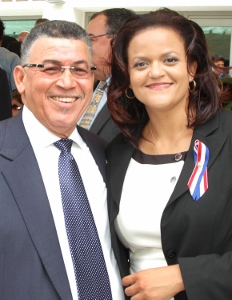
Bush denies shot at Rivers but queries passport issue
 (CNS): The opposition leader has denied taking aim at the education minister during his response to the government’s throne speech and budget presentation last week when he emphasised his own possession of just one passport. However, the UDP leader said that he believes the section in the constitution regarding the qualification of candidates was intended to ensure legislators held only a Caymanian or British Overseas Territory passport. McKeeva Bush told CNS that his reference to his passport in his presentation was meant to illustrate the need for unity rather than the “fussy and fighting “ which he said had characterised the last four years and that as legislators, all the assembly members should hold only one allegiance.
(CNS): The opposition leader has denied taking aim at the education minister during his response to the government’s throne speech and budget presentation last week when he emphasised his own possession of just one passport. However, the UDP leader said that he believes the section in the constitution regarding the qualification of candidates was intended to ensure legislators held only a Caymanian or British Overseas Territory passport. McKeeva Bush told CNS that his reference to his passport in his presentation was meant to illustrate the need for unity rather than the “fussy and fighting “ which he said had characterised the last four years and that as legislators, all the assembly members should hold only one allegiance.
Tara Rivers, the C4C candidate who is now the education minister in the PPM government, successfully defended her right to be elected in the courts in July following an election petition filed by the husband of Velma Hewitt, the UDP candidate who came in fifth in the May General Election.
The challenge was based on the grounds that Rivers had a US passport and was working overseas for a significant part of the seven years prior to the election and therefore did not qualify to run for office. Following the courtroom drama, however, the chief justice ruled in Rivers’ favour and found she was qualified, even though she has a US passport and worked at a law firm in London up until 2009.
Despite that decision and the fact that the election law appears to prevent an appeal on an election petition, the attorneys have made an application to argue for an appeal, which is listed to go before the appeal court for consideration next month.
However, the UDP leader said that his remarks about having only one passport during the budget debate had nothing to do with Tara Rivers, “but everything to mean that we have no allegiance to any other country but the Cayman Islands and with no other country to go to with only a British Cayman Islands passport if our Cayman Islands become so bad that we all can't live here. And we don't want any other passport either. “
Bush said that during his contribution to the debate he was speaking about the gravity of the issues that the country and the people of Cayman are facing and the need to put aside the finger pointing, groundless accusations and the general vindictive melee that the opposition leader claimed had taken place against him and his term in office.
“That has gotten us nowhere. Our people are suffering, crime is rampant and growing and the new immigration bill is not helping Caymanianor foreigner,” Bush told CNS. “So we need 'unity' not an opposition view to everything. And I plan to do what I can to help not hinder. We've had enough of hindrance over the past four years from the previous governor and the then combined opposition.”
Bush said that the second elected member to West Bay was not on his mind when he was making the point and that it was not the first time he had used the point about a passport to illustrate the only allegiance legislators have.
However, he said he had been through several constitutional debates and listened to the reasoning from the 1960's on the constitution about what the clauses and sections regarding who could run for a seat and what disqualifies a person. He indicated that he believes legislators should have only one passport and if they are absent for study they should be in a recognized educational institution.
“Our constitutional provision always was meant by legislators that you hold no other passport,” he said, as he referred to the "Nathaniel Glover" case, a legislator who was the first Caymanian to be elected and disqualified on the basis of having an American passport by the FCO.
“I don't think MLAs should have passports for foreign countries. Having passports for foreign countries means you must swear some form of allegiance to a foreign country. And how do you have allegiance to two countries?” the opposition leader asked.
Bush said he believed the legislators were also very clear in the constitution on what they meant regarding the absence from the islands for study.
“There is no other interpretation of what the earliest legislators and ourselves meant in the discussions from way back may years ago, up until in the 2009 revision of our constitution but that if you were not in a recognized education institution of learning, and you were employed, and out of the islands for the period which the constitution stipulates, even though you took vacations back to Cayman, you were disqualified and could not hold a seat in the Legislative Assembly. That was the meaning to legislators when we always put that section in the constitutions. A school, and not employed,” he added.
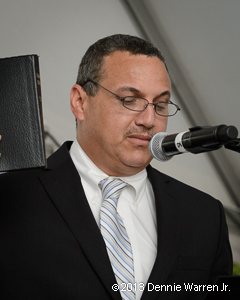
DG begs cash for CS workers
 (CNS): Although the deputy governor is at the centre of government’s cost cutting exercise he went to bat for civil servants on Monday when he made a short contribution to the budget debate and asked for the return of the 3.2% cost of living allowance (COLA) taken from public sector workers as part of the ongoing austerity measures. Franz Manderson explained that the pay rise freeze and COLA cut had not only created hardship but had led to serious inequities in the system, with new civil servants in some fields coming in on higher salaries than those serving for many years. He also warned that the austerity measures could not continue for much longer without the quality of services government provides being compromised.
(CNS): Although the deputy governor is at the centre of government’s cost cutting exercise he went to bat for civil servants on Monday when he made a short contribution to the budget debate and asked for the return of the 3.2% cost of living allowance (COLA) taken from public sector workers as part of the ongoing austerity measures. Franz Manderson explained that the pay rise freeze and COLA cut had not only created hardship but had led to serious inequities in the system, with new civil servants in some fields coming in on higher salaries than those serving for many years. He also warned that the austerity measures could not continue for much longer without the quality of services government provides being compromised.
Speaking in the Legislative Assembly about the government’s 2013/14 budget, he said that this spending plan was “very credible and sustainable” but was not without its challenges and it would be the civil servants who would be expected to deliver on the spending plan. As government will have a healthy surplus, he encouraged the elected members to find a way to give back the COLA at the end of the year.
“People say government should be run like a business, and if they really agree, in any public company which managed to deliver $100 million plus surplus you would reward the employees,” he added. Manderson asked members to think about that at the end of the financial year when the CS delivered that anticipated surplus, pointing out that they would be blamed if they didn’t deliver. Challenging the CS to work harder with less, he said that if they did they should be rewarded.
On the controversial issue of accountancy and transparency for civil servants Manderson said that he was driving that issue forward and performance agreements were now in place for all public sector employees and performance assessments had now been completed for the last financial year. He pointed to the importance of managers who do the assessments to be truthful.
“Unless we are truthful and tell people who are not performing or doing a good job, there won’t beany improvement,” he said, noting that assessments would be audited. He admitted it would take time but the service would get to the point of real accountability.
The issue was brought to the fore during the debate when Ezzard Miller asked who it was in the civil service that had dropped the ball regarding the situation relating to the failure to enforce the pensions law and who had taken the wrap for it.
The independent member for North Side said that there were specific people in the public sector who were charged in the pension unit to perform a function, and while the state of delinquency may have emerged over a long time, he asked how government could allow “people to be so incompetent and still reward those civil servants and members of boards and the unit who were specifically charged and paid.”
Miller said the ones who had failed needed to be identified and terminated. “I ask the deputy governor that something will be done about this kind of incompetence. People are paid to do this job, and regardless of what the minister does it won’t fix the situation if we don’t address this.”
Manderson said he disagreed with the member as the civil servants had done a tremendous amount of work to address the problem and had acted on the “vast majority of recommendations made by the complaints commissioner,” though in reality less than half of those recommendations have been implemented.
The deputy governor said that he was doing his best to drive accountability and performance and he intended to speak to the relevant chief officer, and if civil servants were found not to be performing then action would be taken.
With civil services costs down $13 million in this budget over the last, then the CS would need to be more efficient than ever as it continued to do more with less without compromising services. However, Manderson emphasised the toll the austerity measures, including the pay freeze, the moratorium on jobs and the loss of the COLA, had taken. He warned that the inequities in pay, with people joining after 2007 earning more than ones already working there had to be addressed and government was at the limit of the measures it could now impose without major change.
“The austerity measures can’t continue much longer without impacting service quality,” he said. “Government is looking at other ways of reducing costs and at the structure,” he added, pointing to possible amalgamations, privatization and other structural changes. The deputy governor said that the UK had offered to assist with expertise in this assessment and to help make the critical decisions before the next budget.
Defending the extensive criticism of the police during the budget debate in light of the escalation of violent crime in recent weeks, Manderson said Cayman couldn’t arrest itself out of the crime problem and government and the community had to focus on much more extensive programmes to address the crime problem.
“Crime is everyone’s problem and we must act that way and challenge everyone to get involved and be a mentor,” he said, noting the importance of people reporting what they know about criminality.

Government to introduce fourth type of tendering
 (CNS): Following the government's recent revelations that it is establishing a new procurement office to deal with the way government buys things and acquires services, a report released by the Portfolio of the Civil Services shows that in addition to the existing three models of tendering, a fourth is required to deal with more complex deals government may enter into to when it comes to major capital projects. The report, which sets out its recommendations to improve local procurement as a result of the numerous problems and issues identified by the auditor general, this report points to the need for a competitive dialogue, in some cases before invitations to tender.
(CNS): Following the government's recent revelations that it is establishing a new procurement office to deal with the way government buys things and acquires services, a report released by the Portfolio of the Civil Services shows that in addition to the existing three models of tendering, a fourth is required to deal with more complex deals government may enter into to when it comes to major capital projects. The report, which sets out its recommendations to improve local procurement as a result of the numerous problems and issues identified by the auditor general, this report points to the need for a competitive dialogue, in some cases before invitations to tender.
Under the current Law and Regulations there are just three main types of procurement methods: open tendering, restricted tendering or sole source supply. Officials in the report, which was compiled by a special sub-committee, said that these have proven restrictive in some situations and recommended the fourth type of procurement.
“Competitive dialogue is a process used in complex tenders where open or restricted tendering processes are unlikely to provide a successful outcome,” the authors wrote. “The contracting entity enters into a dialogue with service providers with the aim of developing one or more proposals capable of fulfilling the project requirements, prior to inviting tenders from service providers."
The report, which formed the basis for government’s planned revamp of the existing procurement system, found that not everything was broken but there was significant room for improvement and clarification. The committee recommended strengthening areas of the current system, with significant changes in some areas, as opposed to completely casting aside the existing system and creating an entirely new regime.
“A number of factors inhibit effective procurement practices within the Cayman Islands Government (CIG),” the report stated and pointed to a lack of detailed policies and procedures to guide chief officers, tender committees and civil servantsinvolved in procurement.
It also found that the organization and governance structure in which procurement is carried out lacks clarity of role and robust governance. The failure to prepare business cases to justify projects and the lack ofexperienced staff in the field working in the CS were also noted.
The report also pointed to the importance of clarifying the roles of all of the government entities involved as at least six different agencies are currently involved.
With the creation of a three person procurement office, to be headed by an experienced director of procurement, a post that government is now recruiting, the new office will be responsible for establishing procurement policies and procedures, developing and maintaining standard government procurement documentation, procurement oversight, carrying out some centralized procurement, advising government entities on procurement and training of employees involved in procurement.
See report below.
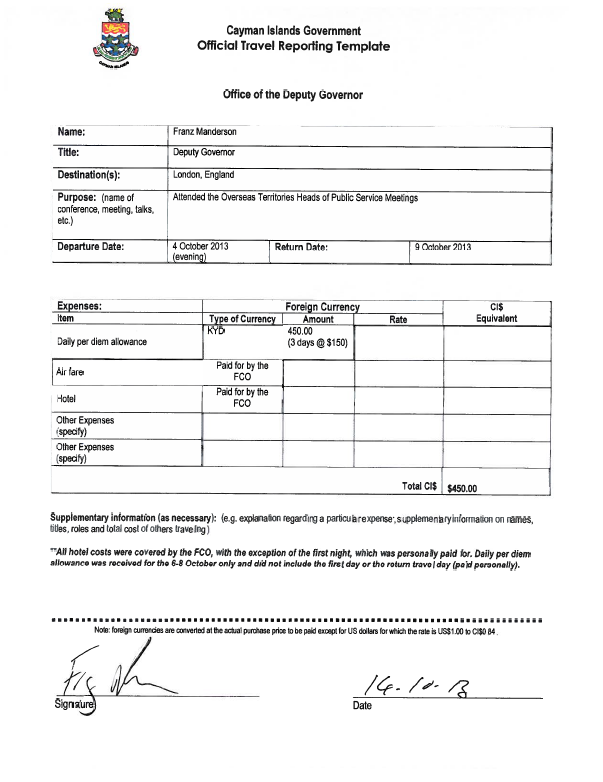
Deputy governor leads by example over travel costs
(CNS): With the new travel policy in place to keep costs down for government officials, both elected and administrative, Deputy Governor Franz Manderson led by example this week by releasing the details of his recent trip to London for a meeting of the UK’s deputy governors. The trip, from the 4 to 9 October, cost the public purse just $450 total for his three day per diem costs, as the flight costs and accommodation were all covered by the Foreign and Commonwealth Office. Manderson released the travel policy form just days after his return in line with the policy that he has worked to put in place.
The new travel policy applies to senior civil servants as well as politicians and it is hoped that it will reduce unnecessary travel and keep costs down when politicians or senior public servants are obligated to travel on business. The new policy mandates that even the premier will fly premium economy or business rather than first class, unless it is unavoidable.
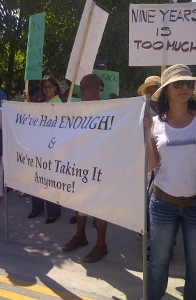
Immigration bill could change
 (CNS): Premier Alden McLaughlin has stated that government is still listening to the concerns of the people regarding the planned changes to the immigration law that will, among other things, remove the key employee and the seven year term limit, enabling every ex-pat worker to make an application for permanet residency if they stay long enough. Government officials and elected members are currently visiting all the districts to explain the plans, and McLaughlin said that the government could still make changes to the bill when it comes to the Legislative Assembly sometime next week during the committee stage, based on the submissions and comments it is receiving. As he welcomed people protesting the bill into the LAlast Friday, he said government was not turning a blind eye or deaf ear to their concerns.
(CNS): Premier Alden McLaughlin has stated that government is still listening to the concerns of the people regarding the planned changes to the immigration law that will, among other things, remove the key employee and the seven year term limit, enabling every ex-pat worker to make an application for permanet residency if they stay long enough. Government officials and elected members are currently visiting all the districts to explain the plans, and McLaughlin said that the government could still make changes to the bill when it comes to the Legislative Assembly sometime next week during the committee stage, based on the submissions and comments it is receiving. As he welcomed people protesting the bill into the LAlast Friday, he said government was not turning a blind eye or deaf ear to their concerns.
Balancing the needs of the business community to attract, recruit and retain the most talented workers with the need to address growing local unemployment is becoming increasingly difficult, and government is hoping to tackle the issue with a new fairer and more precise immigration regime.
But with the perceived marginalisation of Caymanians in the workplace and glass ceiling that some claim is increasingly difficult for local workers to break through, as well as the importation of foreign cheap labour squeezing out Cayman workers from the lower or non-skilled jobs, the opposition to allowing more people to stay longer, even if they don’t get PR in what will be a more stringent new regime, has sparked criticism of the bill.
Nevertheless, government is attempting to win the hearts and minds of the people as it continues its district road-show and McLaughlin made it clear that people could submit their concerns, which would be given consideration. Although he has not yet indicated what areas of the law could be tweaked during the passage of the bill, he said he was well aware that not everyone in country was supportive of proposed changes.
In addition to the meetings, he said, government had spent a considerable amount of time on the radio and TV explaining the changes and the expected impact in an effort to address some of the misconceptions that were fuelling the opposition.
“We know, given the present circumstances with unemployment, their main concerns about the impact and we are taking on board those concerns … and we are still receiving feedback,” he said, noting that he wanted to assure the protestors who had taken part in the March Friday morning, who were in the gallery, that written concerns and submissions would be accepted,as would the petition if it was submitted to him.
“There is still a chance to make some adjustments at the committee stage,” he added, as he encouraged people to submit comments.
The planned changes are causing considerable debate and in some case fuelling existing divisions between locals and ex-pat workers, as well as the parliamentarians. Aside from opposition from the independent members, even government is believed to still be divided over the issue. Veteran PPM backbencher Anthony Eden revealed in his vigorous contribution to the budget debate that he does not support all elements of the law. As a backbencher he will be able to vote for or against or abstain.
However, despite the public disquiet, the anticipated changes are, according to the premier, designed to reduce the number of guest workers that will get through the PR process and ultimately go on to get status. But he has also confirmed that there is no set measure about the numbers that would be acceptable. The premier told CNS following the West Bay public meeting that the government has no plans to set quotas on permits or PR applicants and that there were no plans to set an ideal figure for the increase in the population each year via PR and then status.
The Cayman Status and Permanent Residency Board processed a total of 494 applications in the quarter ending 13 June alone, and while 39 applications were deferred only 11 percent were refused.
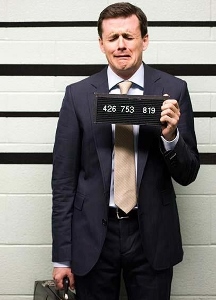
Pension dodgers to be named
 (CNS): Following allegations by the complaints commissioner that more than 1,100 employers were delinquent in their pension contributions, with tens of millions of dollars missing from funds, the director of labour and pensions has revealed that the amount missing is around $14 million and many of the delinquent payers are less than two months behind in their arrears. However, with work already underway to address many of the complaints surrounding pensions, Director Mario Ebanks told CNS that employers and companies facing prosecutions will be named and shamed, with the details of their alleged offences uploaded on to the NPO website. Government also has plans to bring the revised pensions bill to the LA before the end of this fiscal year.
(CNS): Following allegations by the complaints commissioner that more than 1,100 employers were delinquent in their pension contributions, with tens of millions of dollars missing from funds, the director of labour and pensions has revealed that the amount missing is around $14 million and many of the delinquent payers are less than two months behind in their arrears. However, with work already underway to address many of the complaints surrounding pensions, Director Mario Ebanks told CNS that employers and companies facing prosecutions will be named and shamed, with the details of their alleged offences uploaded on to the NPO website. Government also has plans to bring the revised pensions bill to the LA before the end of this fiscal year.
Ebanks told CNS that he was not sure where Nicola Williams, the complaints commissioner, was accessing figures, which she described as “tens of millions of dollars” in her press statement last week, but he admitted that the department faced a considerable workload and numerous complaints.
Also, in a lengthy statement to the Legislative Assembly on Friday, Tara Rivers, the minster responsible, said that work was ongoing to address the problems identified by the Office of the Complaints Commissioner (OCC) but staffing and other resource shortages have hampered efforts. As a result of the work done so far, which involved writing to all delinquent employers, 562 companies had been removed from the delinquency reports by June this year and some CI$1.5 million paid into plans.
Ebanks explained that according to the latest set of complete quarterly delinquency statistics collated by the National Pensions Office (NPO) and given to the OCC, at 30 June some 1,154 companies were delinquent or in arrears for more than 45 days, representing a total of CI$14 million dollars.
“In addition, there are 167 companies on payment plans, for a grand total of CI$3.1 million dollars. It is worthy of note that the assets under management in Cayman’s pensions industry is approximately US$1 billion,” he added.
Ebanks said that the small team at the National Pensions Office, the volunteer board and the ministry responsible “have laboured diligently with a tremendous pensions backlog,” which he said was made worse by the continuing economic decline and a lack of enforcement.
Nevertheless, Ebanks said that the NPO database of complaints is being reconciled and research, inspections, meetings and communication have led to many backlog complaint files being addressed. Improved information sharing between government’s regulatory agencies, such as immigration, trade & business licensing, General Registry, and the Health Insurance Commission was also helping with enforcement and the prevention of new cases.
Despite the allegations made by the complaints commissioner in her original 2010 report and her recent statement that the employers are stealing from employees, in many cases the delinquency is short lived and negligent rather than deliberate, and the minister said in her statement that many employers “traditionally regularize themselves on a short-term cyclical basis” and don’t spiral into serious debt.
While the minister acknowledged that government has still not addressed eleven of Williams’ recommendations, Rivers said that when the revised new national pensions bill comes to the LA, it will address most of the issues the OCC raised. The minister said the original bill, which was presented by her predecessor, had been withdrawn because of a number of concerns raised by the wider public and, as a new government, the bill had to be changed in line with its policy objectives. However, she committed to having the new law in the Legislative Assembly before June 2014.
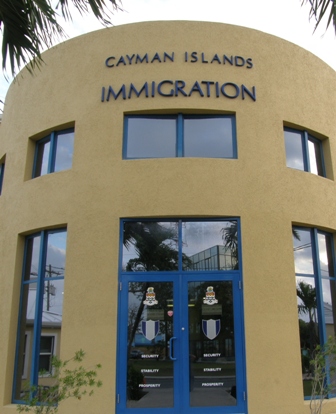
Immigration meeting set for eastern districts
 (CNS): The town hall meetings dealing with the government’s planned Immigration Reform continue in the eastern districts this week. The premier and government officials will be in Bodden Town tonight (Monday 14 October) 7pm at the Bodden Town Civic Centre. The meetings then continue in East End on Tuesday, 15th October followed by North Side on Wednesday, 16th October at the district Civic Centres. Both of those meetings will start at 7-30pm. “Government is holding these meetings throughout the Cayman Islands to help constituents and residents understand the proposals being made in immigration reforms,” officials stated.
(CNS): The town hall meetings dealing with the government’s planned Immigration Reform continue in the eastern districts this week. The premier and government officials will be in Bodden Town tonight (Monday 14 October) 7pm at the Bodden Town Civic Centre. The meetings then continue in East End on Tuesday, 15th October followed by North Side on Wednesday, 16th October at the district Civic Centres. Both of those meetings will start at 7-30pm. “Government is holding these meetings throughout the Cayman Islands to help constituents and residents understand the proposals being made in immigration reforms,” officials stated.
The forums are also presenting an opportunity for government to explain the details of a number of employment initiatives underway to find jobs for Caymanians.
An immigration amendment bill was submitted to the Legislative Assembly on Friday, 20 September as the first phase of the reform of the immigration policy of the Cayman Islands.
Officials are urging everyone to attend one of the meetings.
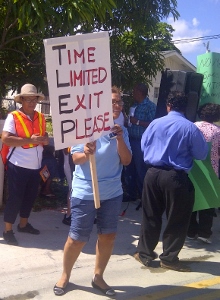
Protesters welcomed into LA
 (CNS): Around 100 people took to the streets Friday morning in George Town to protest the government’s planned changes to immigration law and policy. The men and women, both young and old, marched peacefully but loudly from the government’s new office accommodation building to the Legislative Assembly, where they were invited into the country’s parliament. The demonstration coincided with the debate on the budget speech but the premier, who noted the people’s right to express their concerns, was keen to ensure they came into the House, as he noted that protest is part of democracy.
(CNS): Around 100 people took to the streets Friday morning in George Town to protest the government’s planned changes to immigration law and policy. The men and women, both young and old, marched peacefully but loudly from the government’s new office accommodation building to the Legislative Assembly, where they were invited into the country’s parliament. The demonstration coincided with the debate on the budget speech but the premier, who noted the people’s right to express their concerns, was keen to ensure they came into the House, as he noted that protest is part of democracy.
Among the protestors was a young Caymanian postgraduate whose situation is typical of the experiences of many educated young people coming home and looking for work. Nadine Hollis returned to Cayman this summer following the completion of her master’s degree in hospitality overseas but has not even been invited for interview for most of the numerous applications she has submitted. Nadine said she was joining the protest because of what she described as “the silent treatment” she was receiving from the local hotels, resorts and restaurants to which she had applied.
A clearly intelligent and articulate young woman, she said there were many jobs held by work permit holders that she could do if only an employer would give her a chance. Despite having a master’s degree, a qualification she said she had been advised to get by the very employers who now will not even interview her, Nadine made it clear she was willing to work as a server and start at the bottom.
“I am a realist and I am willing to work my way up,” she said. “I do not expect to get the job of general manager of a hotel. I just want a chance to start gaining proper employment experience and I am willing to take any job in the hospitality sector.”
However, she said that even after taking up the postgraduate study based on the advice she received from the sector, which also included some work placement in the tourism industry, the hotels all say they cannot give her work unless she has experience. This is a vicious circle which is impacting a significant number of local graduates.
Nadine expressed her concerns that the new immigration bill would merely compound the problems of unemployment among locals and make it even more difficult for them to get work. “I have seen work permit holders take up the jobs that I have applied for and that is a slap in the face,” she said, adding that she had little faith in the latest jobs drive as there was no evidence that these initiatives ever worked.
 Older Caymanians who are also unemployed expressed different frustrations related to the abuse of the system by employers. The protesters are adamant that the problems they encounter are linked to the ease with which employers can get permits to employ cheap labour. Many believe that the number of expat workers that are currently here will now, under the new regime, be allowed to stay much longer and in somecases permanently because they will all be able to apply for PR.
Older Caymanians who are also unemployed expressed different frustrations related to the abuse of the system by employers. The protesters are adamant that the problems they encounter are linked to the ease with which employers can get permits to employ cheap labour. Many believe that the number of expat workers that are currently here will now, under the new regime, be allowed to stay much longer and in somecases permanently because they will all be able to apply for PR.
Billy Adam, one of the organisers of the protest, said the proposals to revamp permanent residency did not address the fundamental problem as it relegated access to Caymanian status to points being ticked of a check list, like a car inspection. He lamented the lack of forward thinking and lack of vision about the growth of the local population and what government was trying to achieve. He also criticised the failure to apply the term limits to government employees and described it as a hole in the fence that government was trying to erect around immigration policy.
Many other protestors expressed their deep concern that allowing workers to stay longer would prolong the day when a local could get access to the jobs they held.
Speaking ahead of the march to the LA, Ezzard Miller, the independent MLA for North Side and the politician currently most opposed to the bill, said he was still hoping that the government would amend the bill. He said that the very notion that people were going to protest had spurred government to begin the town hall meetings, and the rally may push them further.
“Government should have consulted with the people first and not behind closed doors with business stakeholders, pandering to whatever it is that they want on the law," Miller said. "They should have asked you how to deal with the problem. This immigration bill is not a solution for you it is a solution for business interests.”
Thanking the crowd for coming out to demonstrate, Miller said it was important that Caymanians stand up for themselves and make it clear what they wanted.

C4C begins promised government scrutiny
 (CNS): The Coalition for Cayman, the group that has always denied being a political party, is beginning its promised scrutiny of government and holding it to account. Despite having three of its members in the current administration and one in Cabinet, in its first submission to Cayman News Service’s Viewpoint section since the election, the group takes aim at the government’s immigration reform plans and is heavily critical of the move to allow 1,500 term limit exemption permit holders to apply for PR. C4C said that following its first public assessment of the immigration reform bill, it also plans to submit further comment for public discussion on the budget and other government policy.
(CNS): The Coalition for Cayman, the group that has always denied being a political party, is beginning its promised scrutiny of government and holding it to account. Despite having three of its members in the current administration and one in Cabinet, in its first submission to Cayman News Service’s Viewpoint section since the election, the group takes aim at the government’s immigration reform plans and is heavily critical of the move to allow 1,500 term limit exemption permit holders to apply for PR. C4C said that following its first public assessment of the immigration reform bill, it also plans to submit further comment for public discussion on the budget and other government policy.
Johan Moxam, one of the committee members, said C4C would be living up to its promise of objectivity and holding government accountable.
“We intend to put government policy and proposed legislation under the spotlight,” Moxam told CNS. “While we have no intention of criticising for the sake of it, we do intend to support when appropriate, advocate in the best interests of the country, scrutinize policy changes and legislative reform to ensure our leaders meet their numerous election promises. Where we feel that policy decisions will be detrimental to the country we will not hesitate to raise concerns and offer alternatives that we believe will be more beneficial to the citizens and residents of the Cayman Islands."
C4C, which stillinsists it is an advocacy group and not a political party, endorsed eight candidates in the 2013 general election campaign who were also members and backers of the group. Three of their candidates were successful and all three, after some false starts, eventually joined the PPM government, including Tara Rivers, who is now a member of Cabinet and closely involved with the immigration reform.
In their first public comment since their three candidates were returned to office, the group criticised the government’s Immigration Bill, stating that it had some strong concerns and pointing to what they believe is the misplaced belief in Cayman that guest workers should have a right to receive citizenship.
They took aim at plans to allow the 1,500 work permits holders who were not key employees to apply for PR. Taking the same position as the two independent members for North Side and East End, whom ironically they never endorsed during the campaign. C4C said the employers of these guest workers knew for seven years that they would need to replace those guest workers.
Dismissing government’s claim that if these 1,500 workers all departed at once it would cause significant economic hardship across the community, C4C said there were far more problems with the bill in general.
They said the proposed amendment to the PR system would create a costly administrative burden in the processing of all of the applications that can now be made for PR. They also claimed that there would be no incentive for employers to become true business partners for Cayman by properly providing employment, training, development and progression opportunities for Caymanians.
Removing the jobs from the pool of those available to Caymanians for longer, perhaps even permanently, would also create further problems for unemployment, the group stated, adding that allowing every guest worker the opportunity to apply for PR could create a larger pool of new citizens than even the mass status grants of 2004.
The group told government, and by extension its three candidates, to adopt a different approach by giving a final extension to the 1,500 guest workers and not allow them to apply for permanent residency. Employers, the C4C said, could then to use the final months to recruit replacement employees, with qualified Caymanians being given priority.
They suggested that this is the only provision in the bill that must be addressed as a matter of urgency and the remaining provisions could be held back to allow for more discussion and review.
“We think the government should re-consider the current proposed approach to immigration reform to one which again puts the primary objective of economic growth being to ensure the effective creation of direct employment and business ownership opportunities that benefit Caymanians,” the group advocated.